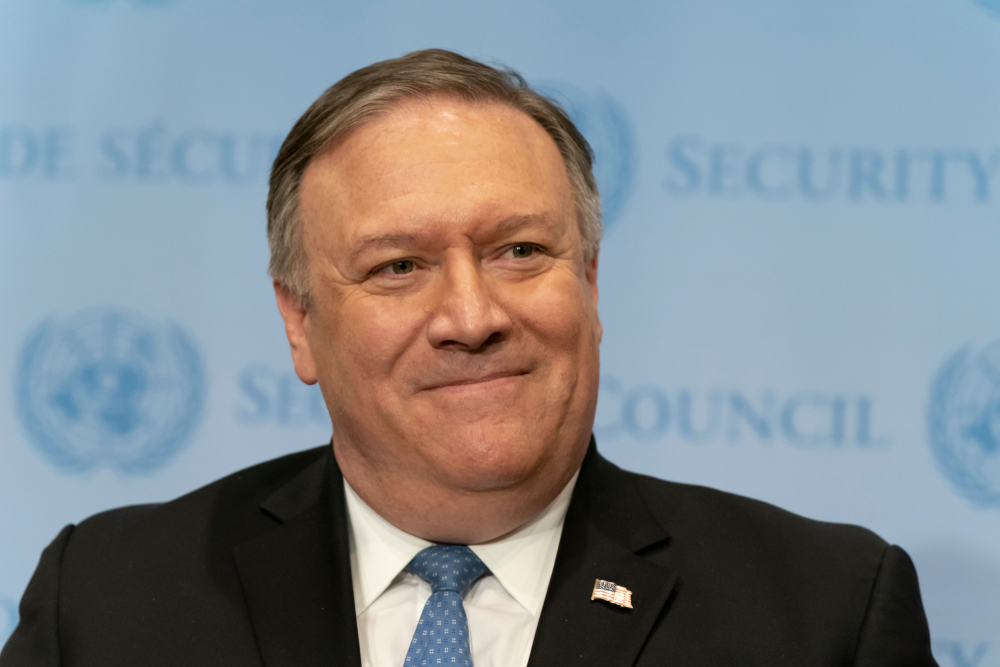by Laila Ujayli and Lizamaria Arias
Last week, circumventing objections from legislators on both sides of the aisle, Donald Trump declared an emergency to expedite more than eight billion dollars worth of arms sales to Saudi Arabia, the United Arab Emirates, and other countries. In doing so, Trump continues to place the interests of the Saudi government and arms contractors over the will of Congress, and in the process undermines the security of peoples in the Middle East, Saudis included.
Lawmakers had previously delayed arms sales to the Saudi and Emirati monarchies on account of their coalition’s devastating military intervention in Yemen, which has resulted in the world’s largest humanitarian crisis and U.S. complicity in war crimes. The Saudi government in particular has drawn Congressional ire for its brutal murder of Washington Post contributor, and U.S. resident, Jamal Khashoggi. To complete the sale and bypass Congressional holds, the Trump administration was forced to utilize the emergency provision of the 1976 Arms Export Control Act (AECA) which allows the president to evade the mandatory 30-day congressional notification period for arms sales as long as he presents the security justification to Congress.
In yet another step in the administration’s march to war with Iran, Secretary of State Mike Pompeo justified the administration’s decision by arguing that the arms sales would somehow “enhance Middle East stability” by helping Saudi Arabia and others to “counter” Iran. Unsurprisingly, his argument falls flat, particularly as the Trump administration careens towards what would be a regionally catastrophic war. Moreover, if stability in the Middle East is the goal, it’s absurd to assume that a country that has fueled a destabilizing war in Yemen can be its broker.
The Trump administration’s work to prolong U.S. involvement in Yemen’s war and its sanctions campaign against Iran have been devastating to both Yemenis and Iranians. It should also go without saying that a war with Iran would not only undermine American interests, but also cause people in the region immeasurably more harm. And as panelists reminded attendees during an event in Washington DC last week on the Saudi government’s targeting of women’s rights activists, the Trump administration’s unwavering support of the Saudi government is not enhancing the security of Saudi citizens either.
One of the activists targeted by the Saudi government is Loujain al-Hathloul, a tireless advocate for an end to male guardianship and women’s right to drive. At the event, Loujain’s siblings, Walid and Lina al-Hathloul, spoke about their sister’s work and her subsequent imprisonment. Loujain was arrested before the announcement of the end of the female driving ban and has remained in government detention since. During a prison visit last December, Loujain disclosed to her family that she had been repeatedly tortured. And today, despite efforts to go through official channels for information, her siblings have no clear sense of her situation or wellbeing.
Meanwhile, Trump has routinely overlooked these gross violations of human rights and failed to hold Saudi Arabia to account. Consequently, both lawmakers and the American public at large must question the U.S. role in emboldening the Saudi government’s brutal policies. As journalist Safa al-Ahmad pointed out to the event’s audience, while the U.S. cannot force change in Saudi Arabia, it can curb its support for the monarchy and send a message that human rights abuses will not go unpunished. For the sake of true “stability” in the region, the United States must stop supporting dictators.
Undeniably, the U.S.’ history with human rights makes us a poor champion—and our domestic record proves we have a ways to go before the U.S. can become any sort of authority on the subject. But the least the administration can do is stop enabling those who violate the rights of Saudi citizens and bomb Yemeni civilians. The Trump administration must leverage the United States’ close relationship with the Saudi government to the benefit of human rights, not just to line the pockets of defense contractors.
By continuing to sell arms to Saudi Arabia, the United States sends a clear signal that the Saudi government is free to continue its brutal torture and imprisonment of advocates like Lujain al-Hathloul, as well as its indiscriminate bombardment of civilians in Yemen, without incurring meaningful consequences. If Congress wants to disrupt this message, lawmakers on both sides of the aisle must push for legislation to “block the transfer, sale, or authorization for license of bombs and other offensive weapons” to Saudi Arabia and assert loudly that—despite the Trump administration’s best efforts—the blank check the U.S. has given to Saudi Arabia is approaching its expiration.
Lizamaria Arias is a Fall 2018 Herbert Scoville Jr. Peace Fellow focusing on the effects of emerging technologies on crisis stability. Follow her on twitter @lizamaria_arias.






@ Zahra Mirza
Your remark fails to correspond to my argument: “What is the meaning of the word suffering? … The fate of those oppressed by the empire is true suffering”. Depending on its ‘context’ and its ‘recipient’, suffering can have multiple relative meanings; therefor, your assertion that “we cannot compare” the suffering of those under repressive colonial powers with the suffering of “the people in Iran”, is a hasty generalisation, considering that “the people in Iran” encompasses many groups with horrendous narratives of loss, when it comes to death and suffering ‘no one’, including you, has the moral authority to classify whose death is more, or less, painful!
Your patronising advice – that “self-censorship is better than wishing for death of millions of fellow citizens via foreign military regime change”, and “If one needs to choose, one must always chose the lesser of the evils”, also avoids the main points raised in my comment. To preach that we should accept misery just because our suffering is less than of those in Iraq or Syria, and should be vigilant because knives are out to struck us in the back, resonates with our self-declared holy preachers who, for 40 years in the face of the naked injustice, corruption and abuse of power, keep reminding us of the suffering of the Prophet’s descendants and the tragedy of Karbala, 1400 years ago, hence, any criticism is condemned outright as siding with the enemy. Once the politicians gain power forget that it is the people who are the main ‘source of legitimacy’.
For 40 years as a nation with millions of highly educated people we have failed to have a ‘constructive criticism’ because of such ‘hypocritical preachers’ who while themselves been getting ‘fat’ and become ‘extremely’ wealthy have been preaching ‘humility’ and ‘self-sacrifice’: they have caused more division, alienation and hatred in our society, and harmed the Revolutionary values more than all our outside enemies with their propaganda apparatuses could ever do!
In theory it is easy to say “one must always chose the lesser of the evils”, but in reality when they come to resemble each other, when redline becomes blurred in the eyes of the common people then, regrettably, it will be hard to identify the lesser evil to preserve their solidarity.
@FYI,
No! The US support for Israel is NOT religious! President Truman was reluctant to recognize the newly illegal state of Israel following the UN recognition of Israel on May 14, 1948. Eventually he was advised and convinced to do so because of the geopolitical situation of the time and because of the big Bear being so close to the oil fields in the ME. With the young and inexperienced Shah in Iran and the Nomads in states around the Persian Gulf, the US had to have a dog on leash not only to keep the Nomads under its thumb and to prevent any disruption in flow of oil badly needed for the vast expansion of US economy post WWII. Once the Shah was reinstalled in 1953 and thereafter the US had 2 dogs on leash for protecting the resources and flow of the resources through the Persian Gulf!
It’s all about money and the religious excuse is a cover for the US! Once the oil wells are dried up in the ME/NA and/or other resources are discovered elsewhere the ME/NA will be left alone and backing of Israel will also disappear. Guaranteed!
Monty Ahwazi
Truman was raised in a Protestant Fundamentalist millieu; he had imbibed the same non-sensical attachment to Old Testament as other Protestant Churches in US and UK.
Marshall advised him against an action that would initiate decades of instability in the Middle East. Truman ignored Marshall.
When Israelis attacked USS Liberty, Americans did exactly nothing. It would have been a supremely sacrilegious act to retaliate against Israel, the Chosen people of Fundamentalist America.
Later on, during the 1973 War, Americans put their nuclear weapons system on alert, risking WW3 for Israel.
Even the Kissinger Shuttle diplomacy that resulted in Camp David Accords was at the Israeli initiative, it did not originate within US Goverment.
The wages of all of that is the religious war in which US has so far destroyed 2 enemies of Israel, was helped by the Ikhwan government of Turkey in trying to destroy Syria, is helping Saudi Arabia destroy enemies of Israel in Yemen, is waging an economic siege war to destroy Iran, all the while laying down the legal basis of war in the years to come.
Regrettably, even if Americans were interested in ending this war between Jews and Muslims, they cannot do it.
I suppose after a war in which major cities in Israel have been destroyed and damaged, Israelis might sue for Peace.
At that time, Americans may be able to dismantle their own war against Iran and others and pack and go home.
That is likely years or decades into the future.